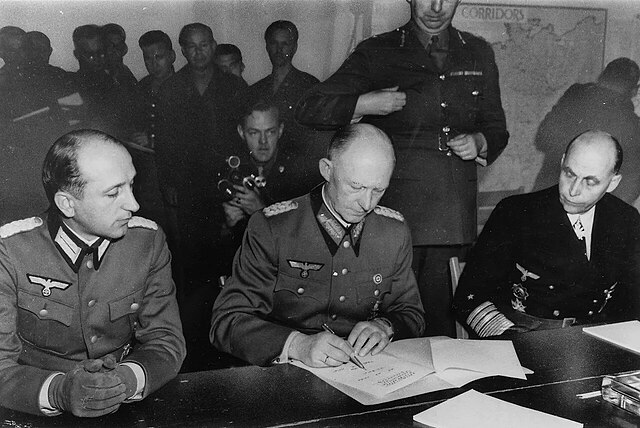尼禄法令(德语:Nerobefehl),亦称焦土法令,正式名称为《帝国领土拆除法令》(德语:Befehl betreffend Zerstörungsmaßnahmen im Reichsgebiet),是1945年3月19日由阿道夫·希特勒下达,纳粹德国国防军最高统帅部颁布的一项法令。该法令旨在下令摧毁纳粹德国的基础设施,以防止盟军在深入德国境内时使用这些设施。其大致内容为“命令撤退的同时对占领地区的工业、文化、经济等进行破坏…”。随后被称为尼禄法令,以罗马皇帝尼禄的名字命名,根据一个虚构的故事,他在公元64年设意制造了罗马城的大火[1]。战中阿尔伯特·施佩尔刻意不遵守该法令。
背景

在1945初,德国的处境已陷入绝望[2]。其大部分征服的领土都已被解放或被重新夺回,突出部战役已经失败,盟军正从德国东方及西方同时向德国本土进攻。然而,希特勒并不接受无条件投降,并将其视为跟凡尔赛条约一样的耻辱。甚至据希特勒身边的一些人所言,希特勒认为德国人民令他失望,他们辜负了他们的伟大任务而且活该跟他的政权一同陪葬[3]。
这并不是第一次希特勒试图在基础设施被敌人利用前将其摧毁。就在巴黎解放的不久前,希特勒下令在重要地点——例如埃菲尔铁塔,及一些重要运输枢纽放置爆裂物,如果盟军靠近城市,时任巴黎军政长官迪特里希·冯·柯尔提兹将会引爆炸弹,使巴黎仅仅留下“碎片”[4]。然而迪特里希并没有执行命令并向盟军投降,其后,迪特里希称此时他已意识到“希特勒已经疯了”。同样地,在1944年末,盟军解放荷兰前夕,希特勒发布命令,要在荷兰执行焦土政策,但尼德兰国家专员阿图尔·赛斯-英夸特极大程度地限制了该政策执行的规模[5]。
Background
By the beginning of 1945, the German situation was desperate.[6] Most of the conquered territories had been liberated or recaptured, the Ardennes Offensive had failed, and Allied armies were advancing on Germany proper from both the East and the West. However, Hitler was not willing to accept the terms of unconditional surrender, and considered this as repeating the same shame as Versailles.[6] Moreover, according to some around him, Hitler came to view the German people as having failed him, unworthy of their great mission in history and thus deserving to die alongside his regime.[7]

This was not the first time Hitler had tried to destroy infrastructure before it could be taken. Shortly before the Liberation of Paris, Hitler ordered explosives to be placed around important landmarks, such as the Eiffel Tower, and key transportation hubs. If the Allies came near the city, the military governor, General Dietrich von Choltitz was to detonate these bombs, leaving Paris "lying in complete debris."[8] Von Choltitz, however, did not carry out the order and surrendered to the Allies, later alleging that this was the moment he realized that "Hitler was insane." Similarly, Hitler had issued orders to enact a scorched earth policy upon the Netherlands in late 1944, when it became obvious that the Allies were about to retake the country, but Arthur Seyss-Inquart, the Reichskommissar in charge of the Netherlands during its occupation, was able to greatly limit the scope to which the order was executed.[9]
The Decree

Its most pertinent section reads as follows:
It is a mistake to think that transport and communication facilities, industrial establishments and supply depots, which have not been destroyed, or have only been temporarily put out of action, can be used again for our own ends when the lost territory has been recovered. The enemy will leave us nothing but scorched earth when he withdraws, without paying the slightest regard to the population. I therefore order:
1) All military transport and communication facilities, industrial establishments and supply depots, as well as anything else of value within Reich territory, which could in any way be used by the enemy immediately or within the foreseeable future for the prosecution of the war, will be destroyed.[10]
Actions

The decree was in vain. The responsibility for carrying it out fell to Albert Speer, Hitler's Minister of Armaments and War Production. According to him, Speer was appalled by the order and lost faith in the dictator. Just as von Choltitz had several months earlier, Speer deliberately failed to carry out the order. Upon receiving it, he requested to be given exclusive power to implement the plan, instead using his power to convince the generals and Gauleiters to ignore the order. Hitler remained unaware of this until the very end of the war, when Speer, while visiting Hitler in his Berlin bunker, admitted to him that he deliberately disobeyed.[11] Hitler was angry with his minister, but allowed Speer to leave nonetheless. Hitler committed suicide on 30 April 1945, forty-two days after issuing the order. Shortly afterwards, on 7 May 1945, General Alfred Jodl signed the German military surrender, and on 23 May Speer was arrested on the orders of U.S. General Dwight D. Eisenhower, together with the rest of the provisional German government led by Admiral Karl Dönitz, Hitler's successor as head of state.
参见
- Albert Speer
- Gotthard Heinrici
- Hellmuth Reymann
- Is Paris Burning?
- Morgenthau Plan
- Destruction of Warsaw
- Railroad plough
- Scorched earth
参考文献
Wikiwand in your browser!
Seamless Wikipedia browsing. On steroids.
Every time you click a link to Wikipedia, Wiktionary or Wikiquote in your browser's search results, it will show the modern Wikiwand interface.
Wikiwand extension is a five stars, simple, with minimum permission required to keep your browsing private, safe and transparent.